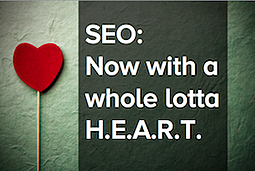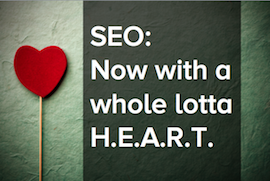 This is an opinion piece by Barry Feldman, president of Feldman Creative.
This is an opinion piece by Barry Feldman, president of Feldman Creative.
You must have seen those CIALIS commercials on TV. Near the end, like all pharmaceutical commercials, the voiceover reels off the potential side effects and warnings. The announcer instructs, “Consult your physician if your erection lasts more than four hours.”
I believe I have a better (and less embarrassing) suggestion. Read about SEO. Doing so should reverse any increased blood flow fast.
Maybe SEO excites you. Not me. SEO is a mechanical thing, and I’m all about the right brain, a creative type. It’s kind of like when I’m around a bunch of gear heads and the conversation gets into manifolds and transfer cases. These are car parts, right? Ick.
Give me some tactile stuff. Creature comforts. Sound systems. Fancy buttons. If I’m looking at the engine, it means I’m stranded on the side of the road with the hood up.
"SEO" Is a Misnomer
My disdain for SEO begins with the very definition of the abbreviation: search engine optimization. When you practice SEO, you don’t optimize the search engine. You optimize your web pages.
To do this correctly, you have to go through a series of gyrations with things such as meta tags and subscribed-to principles such as keyword density. After you tackle all these garbanzo beans, SEO experts then tell you you’re only 10% of the way to the promised land: high search engine result page (SERP) rankings.
Next, you’re tasked with taking on the 90% that really matters: backlinks. Translated, this means you need other websites —preferably thousands of them — to publish links to your website. As a result, you gain authority. Authority earns you higher rankings for your keywords. Higher rankings gets you more traffic to your website, which means SEO success — or, at least, it’s supposed to.
Enter SEM
You want to deal with all this stuff? No? Me neither. Luckily, we don’t have to. The SEO craze of the 21st century gave rise to an entire industry and bona fide professionals could be hired to pound the backlinks beat for you.
Many of these companies called the new field “search engine marketing,” SEM, another misnomer. If you examine the tactics most SEMs practiced, you’d understand “M” really should stand for “manipulation.”
Search engine manipulators created backlinks, but largely with questionable tactics. Backlinks were commonly purchased and placed on low quality sites and online directories, which had no purpose other than to host links. No one visited these sites because they offered no value.
Google Grew Weary of the Scam
In the quest for rankings, SEO and SEM professionals have been messing with the system for years. King Google finally got fed up and summoned their soldiers to restore order.
Out came the updates. Penguin. Panda. Then came updates to the updates. More birds. More bears. Scammers were getting snuffed and spammy sites nosedived.
A new algorithm is among us now: Hummingbird. Playing the SEO game the same way won’t fly any longer.
Hummingbird marks a new quest, or goal, for search. Old school SEOs chasing Google’s algorithm with a focus on keywords are to become decreasingly relevant. The new rules make search about the user’s context.
Pundits are calling it “semantic search.” As it begins to take hold, you’re left with only one credible option: focus on the reader’s needs with your content. High quality content, the kind that prompts readers to recognize you as a trusted authority, is the only sure way to rank.
Raise Your Hand If You’re a Robot
Your hand’s not up. There’s not a robot among us. The act of serving links to someone searching for content on the web remains a function of computers and software, but a new wave is forming.
Of course, we’re going to need a new acronym. I submit we call it “HEART.”
I’ll spell it out. HEART stands for “human emotion and real trust.”
As members of an infinitely connected society, we don’t want phonies. We don’t want facades. We really don’t even want web pages. We’re searching for something real.
We’re Searching for HEART
We all have a reason for doing what we do online. For most of us, money plays a part. There’s no shame in putting an “e” into our commerce system. Nor is there shame in wanting to have your company discovered via search.
But now, thanks to some major refinements to the almighty search system that brings consumers and companies together, there’s new hope in finding what we’re really searching for: people who want to help. People who feel good about making you and me feel good. People we can trust.
Hummingbird demands you scrap your ambitions to play the keyword game forever more. Google now relies on humans to do the optimization.
It’s the little bird telling you, “Think human. Put some heart into your content.”
Barry Feldman is president of Feldman Creative. He creates compelling content by telling stories. He's a content marketing strategist, copywriter, creative director, speaker, and author. He also specializes in creating websites, ebooks, and integrated online marketing programs. You can follow him on Twitter @FeldmanCreative.


